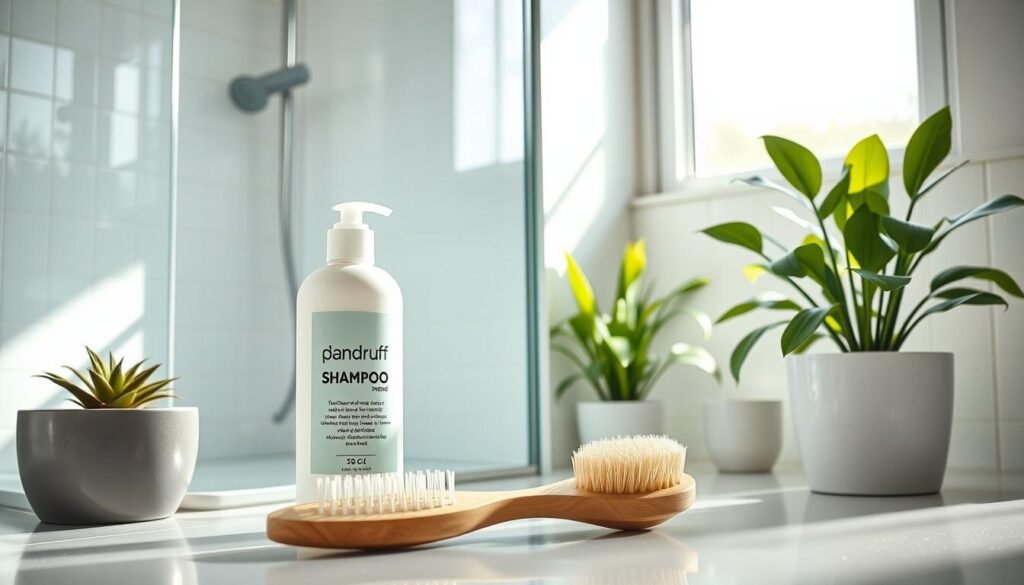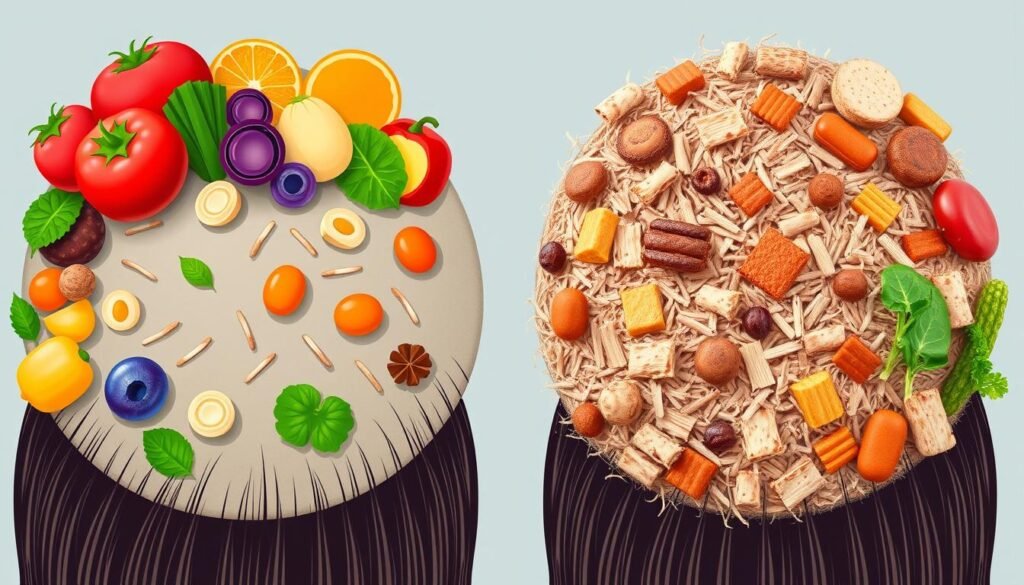Have you ever thought about what your dandruff really means? Is it just a small issue, or could it be more? Dandruff, with its flaky skin and itchy scalp, seems like a small problem. But, it’s actually quite complicated. The reasons for dandruff vary, including hormonal shifts, skin issues, and serious conditions like seborrheic dermatitis. In this expert guide, you’ll learn all about dandruff. We’ll start with the common signs and explore the many reasons behind it.
Key Takeaways
- Dandruff can indicate underlying health issues.
- Common symptoms include flaky skin and an itchy scalp.
- Hormonal changes may exacerbate dandruff.
- Understanding dandruff causes and symptoms is essential for effective management.
- Proper hygiene plays a vital role in reducing dandruff.
- Dietary deficiencies may also contribute to dandruff severity.
Understanding Dandruff
Dandruff is a common issue where you might see white or yellow flakes on your scalp. This problem can make people feel self-conscious. Depending on its severity, it can either be a mild annoyance or harm scalp health.
This condition doesn’t pick favorites. It affects kids, teens, and adults, no matter their gender or background. The fact that it’s so common highlights the importance of good scalp care. It shows we need to know how to prevent and treat it.
Knowing the symptoms and causes of dandruff is key to fighting back. Look at your skin type, stress levels, and what you eat. Understanding and tackling these areas can help maintain a healthy scalp.
Common Causes of Dandruff
Dandruff can come from many things that make the scalp unhealthy. A big reason is a dry scalp. It gets worse in cold weather or if you use harsh hair products a lot. People with this problem often see more flakes and feel itchier.
Seborrheic dermatitis is another big cause of dandruff. It shows up as red, oily spots that can appear on the scalp. This makes the scalp itchy and not comfortable. If you have seborrheic dermatitis, dealing with dandruff may be tough because of these skin issues.
Your genes can also affect your chances of getting dandruff. Getting dandruff might be more likely if your family has had scalp problems. Skin problems like psoriasis or eczema can also make dandruff worse. It’s important to find out and treat these underlying issues.
If you want to know more about how to handle dandruff, there are good ways to treat it. To learn more, check out this detailed guide on how to manage dandruff well.
| Cause | Description |
|---|---|
| Dry Scalp | Caused by environmental factors leading to flakiness and irritation. |
| Seborrheic Dermatitis | Characterized by red, greasy patches and requires specific treatment. |
| Genetic Predisposition | Family history increases the likelihood of developing dandruff. |
| Skin Conditions | Conditions like psoriasis and eczema can worsen dandruff symptoms. |
Dandruff: Causes and Symptoms
Dandruff is often caused by a dry scalp or malassezia fungus. Knowing this can help control it better.
Dry Scalp and Its Relation to Dandruff
A dry scalp can make dandruff worse by speeding up skin cell turnover. This happens when there’s not enough moisture. It leads to noticeable flaky skin.
Staying hydrated and using moisturizers are key. Specially formulated shampoos and oils add moisture. This helps fight dryness and flaking. For tips on keeping your scalp healthy, check out this great article on scalp care.
Role of Malassezia Fungus
The malassezia fungus lives on our scalps. But if it grows too much, it can cause dandruff. It likes oily areas and breaks down skin oils. This can irritate the skin and increase flaking.
To manage malassezia, use certain shampoos that control its growth. This reduces itching and makes flaky skin less visible. Regularly using the right products can prevent overgrowth, keeping the scalp healthy.
Symptoms of Dandruff
Knowing the symptoms of dandruff helps in treating it. The main signs are flaky skin and an itchy scalp. These symptoms vary and can affect a person’s life. It’s important to know these signs for the right treatment.
Identifying Flaky Skin
Flaky skin is a clear sign of dandruff. It appears as small, white or yellowish flakes. These can be on the scalp or fall onto clothes.
The amount of flaky skin can be a little or a lot. This can make people feel embarrassed and look for ways to fix it.
Understanding Itchy Scalp
An itchy scalp is another major sign of dandruff. It causes discomfort and irritation.
Things like dryness or certain hair products can make it worse. Too much scratching may lead to bigger skin issues. This can hurt a person’s confidence and their daily life, showing the need for good dandruff care.
| Symptom | Visual Indicators | Psychological Impact |
|---|---|---|
| Flaky Skin | White/yellow flakes on scalp and shoulders | Embarrassment, self-consciousness |
| Itchy Scalp | Persistent scratching, redness | Discomfort, frustration |
Impact of Hormonal Changes on Dandruff
Hormonal changes can greatly affect the skin, including dandruff issues. When hormones fluctuate, it can make the scalp oilier. For example, during puberty, pregnancy, or when undergoing hormonal therapy, people might see more scalp oil. This extra oil can create a good place for malassezia to grow. This fungus is often linked with dandruff and seborrheic dermatitis.
Hormone shifts can make seborrheic dermatitis more complicated. If your scalp gets too oily, you might start to notice more flakes. Knowing about these hormone effects is key to managing dandruff well.
To lessen dandruff from hormonal changes, being proactive is necessary. Using anti-dandruff products, like Head & Shoulders, can be effective. It’s also important to keep your hair moisturized and your scalp clean. If dandruff doesn’t improve or gets worse, it’s best to see a doctor.
| Hormonal Change | Impact on Scalp | Dandruff Risk |
|---|---|---|
| Puberty | Increased oil production | High |
| Pregnancy | Fluctuating hormone levels | Moderate |
| Hormonal Therapy | Varied effects on oiliness | Possible |
| Menopause | Decreased oil production | Changes observed |
For more details on managing dandruff and hormones, check this resource.
The Role of Hygiene in Dandruff Management
Keeping up with proper hygiene is key to managing dandruff well. Washing your hair regularly removes excess oils and dead skin, which helps keep the scalp healthy. It also lowers the risk of getting dandruff. It’s important to adjust how often you wash your hair based on your hair type.

If you have oily hair, washing it more often can help control dandruff. This is because it stops oil from building up, which fungi like. For those with dry hair, washing less and using moisturizing shampoos is best. This keeps the scalp moist without removing too much oil.
- Use anti-dandruff shampoos: Look for shampoos with ingredients like pyrithione zinc or ketoconazole. They fight flakes and fungi.
- Choose natural remedies: Tea tree oil or aloe vera can soothe the scalp and aid in its care.
- Stay consistent: It’s important to have a regular hair washing schedule for keeping dandruff at bay long-term.
Good hygiene also means keeping your hair tools clean, like brushes and combs. Cleaning them regularly will lower the chance of putting flakes and bacteria back onto your scalp.
| Hair Type | Washing Frequency | Product Recommendations |
|---|---|---|
| Oily | Daily to every other day | Shampoos with salicylic acid or coal tar |
| Dry | 2-3 times a week | Moisturizing shampoos, avoiding harsh sulfates |
| Normal | Every 2-3 days | Balanced pH shampoo |
It’s not just about how often you wash. Choosing the right products for your hair type is crucial. Doing so greatly improves scalp care and reduces dandruff.
How Stress Influences Dandruff
Stress greatly affects our health, including our scalp. It’s a key player in causing dandruff, making the scalp more sensitive and irritated. When we’re stressed, our bodies make more hormones. These hormones can mess up the natural oils on our skin.
This mess leads to a dry and flaky scalp, making dandruff worse. Also, stress can make the scalp itch more. Scratching more can irritate the scalp even further. It might even cause infections, adding to the dandruff issue. Keeping stress in check can really help your scalp stay healthy.
To lessen stress’s impact on dandruff, try adding stress-busting habits to your day. You could try:
- Regular physical activity
- Meditation and mindfulness practices
- Balanced nutrition to support overall well-being
- Sufficient sleep to reduce fatigue and stress levels
Dealing with stress might help control dandruff by reducing itchiness and irritation. By understanding how stress affects the scalp, people can better manage their condition. This understanding encourages effective steps towards finding relief.
| Stress Management Techniques | Benefits |
|---|---|
| Physical Activity | Boosts mood and reduces stress |
| Meditation | Enhances relaxation and focus |
| Balanced Nutrition | Supports skin health |
| Sufficient Sleep | Reduces fatigue |
Dietary Deficiencies and Dandruff
Proper nutrition is key to keeping the scalp healthy and dandruff at bay. A lack of important nutrients can cause dry scalp and more dandruff. Not having enough zinc, B vitamins, and essential fatty acids is often to blame.
Zinc helps the skin repair itself and reduces inflammation. B vitamins are important for cell metabolism and keeping the skin moisturized. Without these nutrients, the scalp might get dry and flaky. To avoid this, eating a variety of foods full of nutrients is key.
- Include sources of zinc, such as nuts, seeds, and whole grains.
- Opt for foods rich in B vitamins, like legumes, eggs, and leafy greens.
- Essential fatty acids can be found in fish, flaxseeds, and avocados.
If dandruff persists even after changing your diet, considering supplements or essential oils might help. Better nutrition improves scalp health and overall health too.

Conclusion
Knowing why you get dandruff and how it feels is key to fighting it off. The article shows that a dry scalp, changes in hormones, and stress play big roles. If you know what causes your dandruff, you can start to make it better and feel more comfortable.
To get a healthier scalp, care for it every day, keep stress low, and eat well. Doing these things helps stop dandruff. It makes your skin less flaky and itchy. Plus, it’s good for your hair. Remember, dandruff isn’t just about looks. It can make you feel bad about yourself too.
If your dandruff is really bad, it’s a good idea to see a doctor. They can give you special advice on how to deal with it. With the right help, you can take charge of your scalp health. And you’ll feel more confident too.